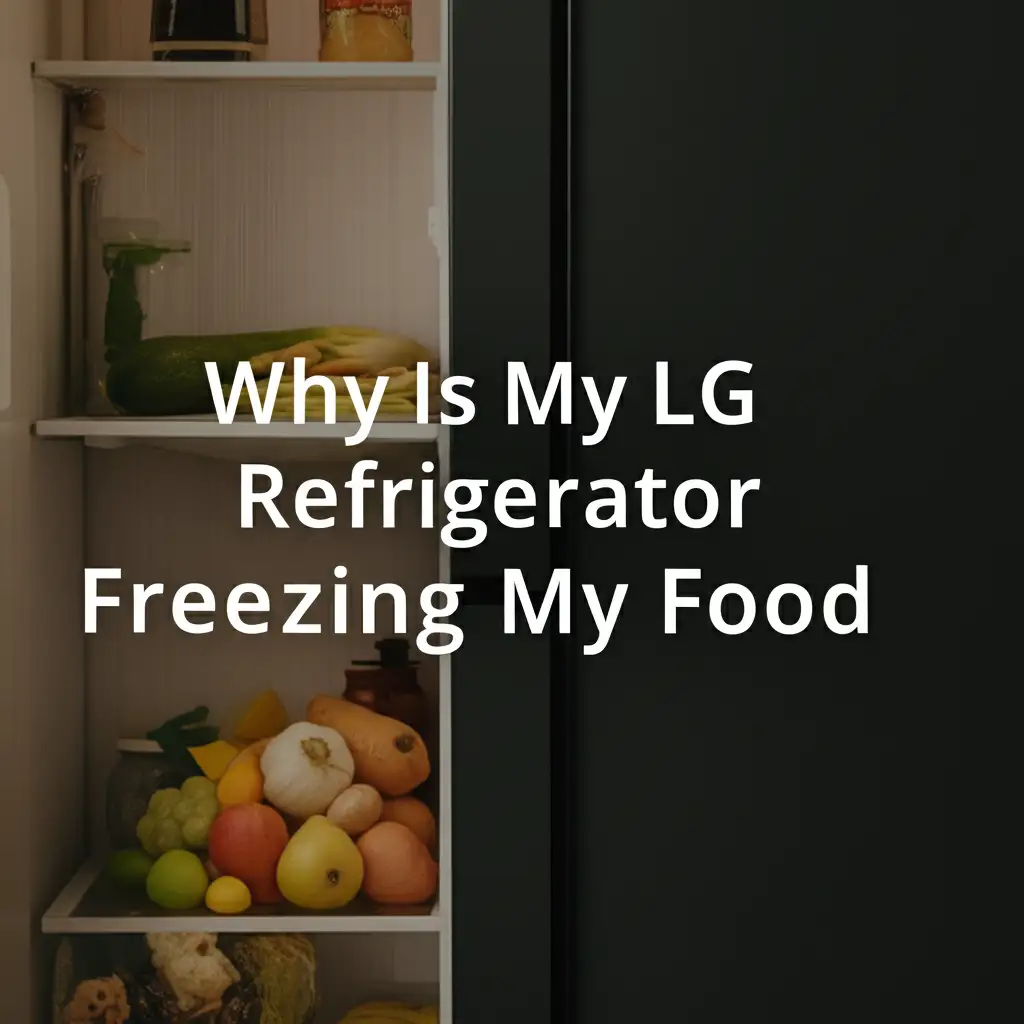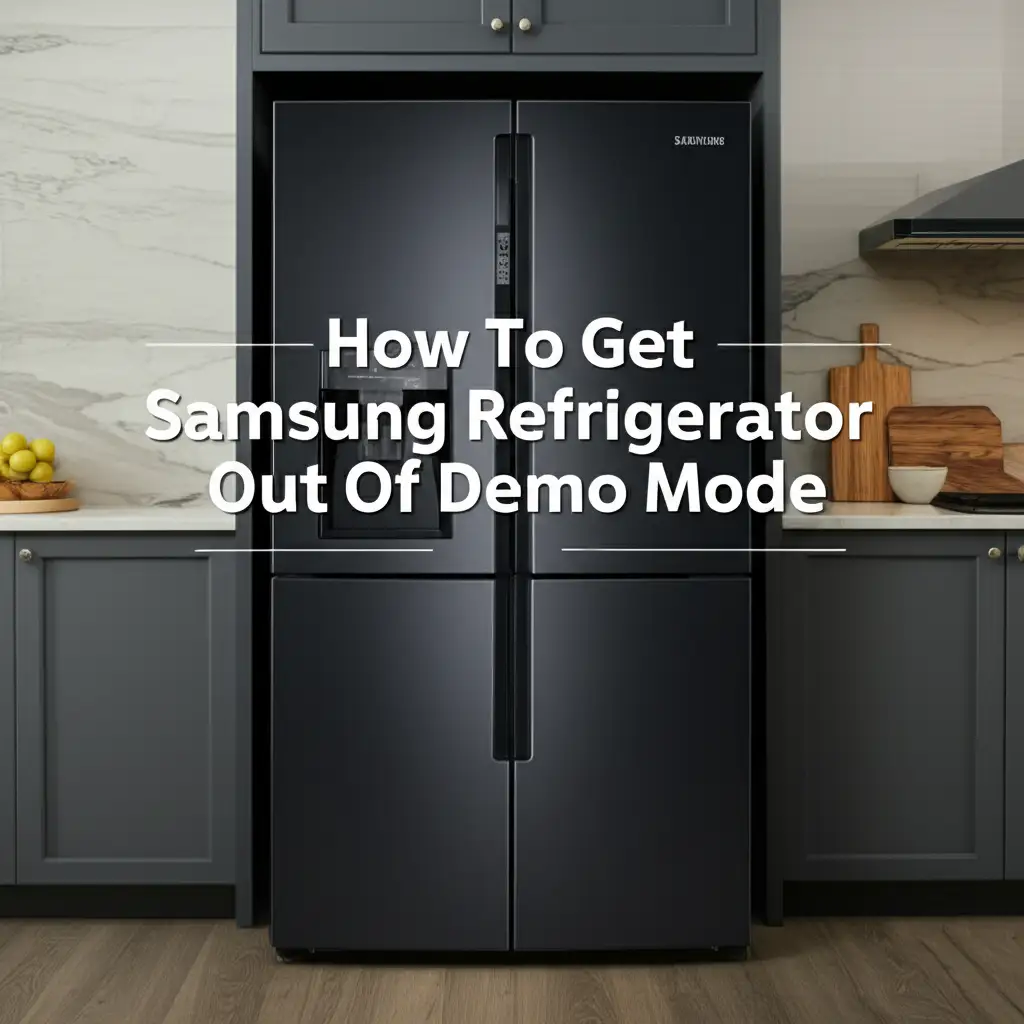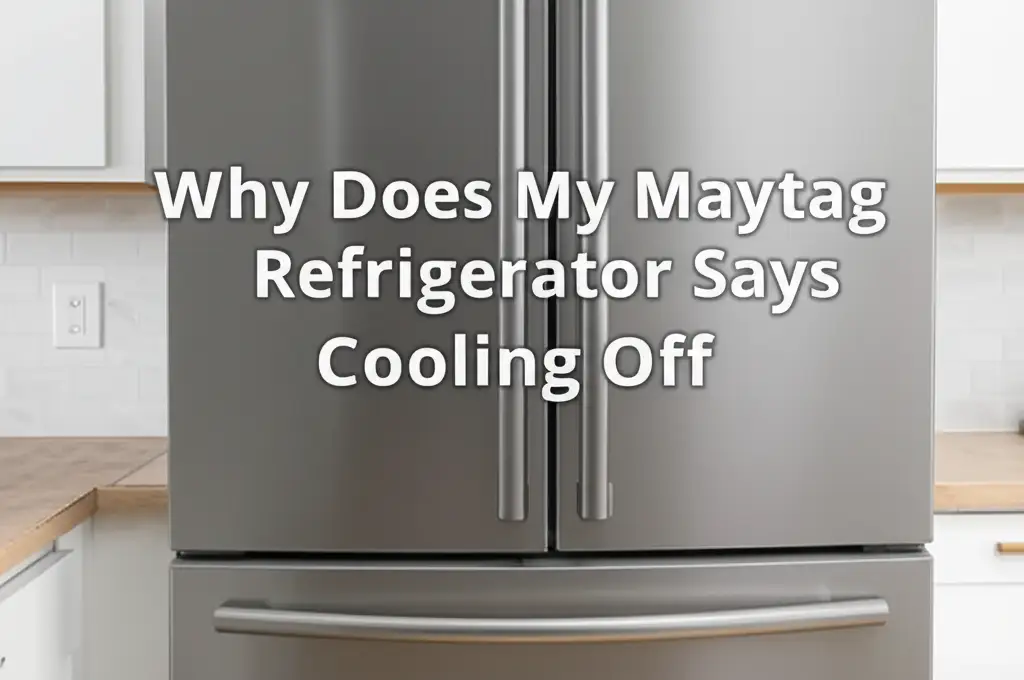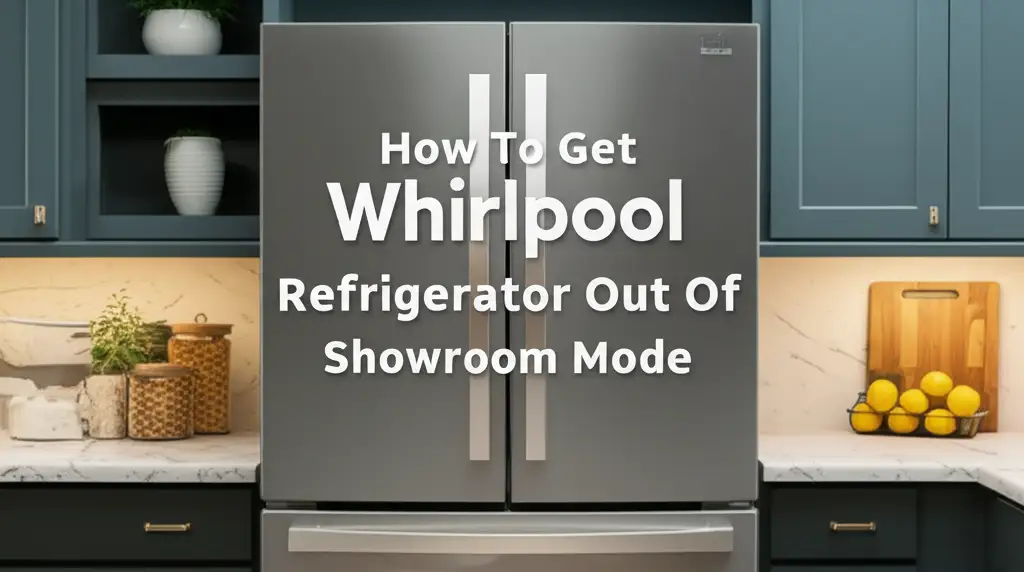· Katria Melrose · Appliance Troubleshooting · 18 min read
Why Is My Bosch Refrigerator Freezing My Food
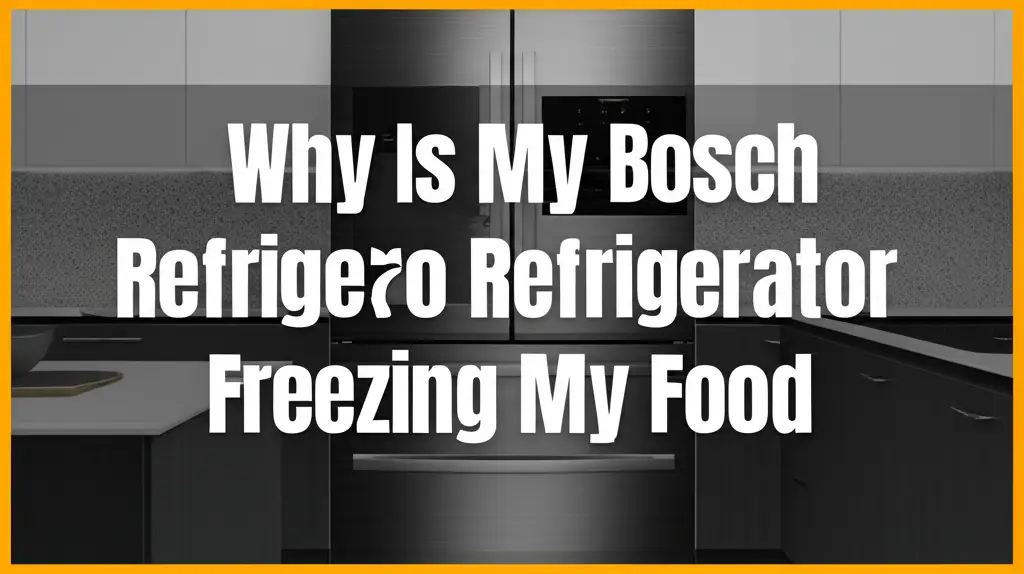
Stop Your Bosch Refrigerator Freezing Food
Few things are more frustrating than opening your refrigerator only to find your fresh produce and dairy frozen solid. This common issue, especially with a high-quality appliance like a Bosch refrigerator, signals a problem that needs attention. When your Bosch refrigerator is freezing food, it is not just an inconvenience; it can lead to wasted groceries and potential damage to your appliance. You want your food chilled, not turned into an ice block.
I understand how vital a properly functioning refrigerator is for any home. This guide will help you understand why your Bosch refrigerator might be freezing your food. We will explore common culprits, from simple setting errors to complex component failures. I will provide clear troubleshooting steps you can follow to diagnose and potentially fix the problem. By the end, you will have a better grasp of how to bring your Bosch back to its optimal cooling performance.
Takeaway
- Check temperature settings: Ensure your Bosch refrigerator is set between 37°F and 40°F (3°C and 4°C).
- Inspect door seals: Look for cracks or gaps allowing warm air in, causing overcompensation.
- Clear airflow vents: Move food items away from vents to ensure proper air circulation.
- Examine damper control: Verify the damper is not stuck open, sending too much cold air.
- Test thermistor/sensor: A faulty thermistor can misread temperatures, leading to overcooling.
- Consider professional help: For complex issues like control board or defrost system failures, consult an expert.
Your Bosch refrigerator is freezing your food because of an issue with its temperature regulation system. This can stem from incorrect thermostat settings, a faulty thermistor or damper control, obstructed air vents, or compromised door seals. Addressing these components can restore proper cooling.
Understanding Your Bosch Refrigerator’s Temperature Control
Your Bosch refrigerator uses a sophisticated system to keep your food fresh. It maintains a consistent cool environment. The refrigerator’s temperature control relies on several key parts. A thermostat, or more commonly a thermistor, senses the internal temperature. The control board processes this information. It then tells the compressor when to run. This cycle keeps everything at the right chill level.
Sometimes, this system can malfunction. If the refrigerator gets too cold, something is off. A faulty thermistor might send incorrect readings to the control board. The control board then thinks the fridge is warmer than it is. It tells the compressor to work harder, sending more cold air into the compartment. This results in your food freezing. Understanding these parts is the first step in troubleshooting.
Thermistor Malfunctions
The thermistor is like the fridge’s internal thermometer. It is a small sensor that detects temperature changes. It sends these temperature signals to the control board. If the thermistor goes bad, it can send inaccurate signals. For example, it might tell the control board that the refrigerator is too warm, even if it is already very cold. This forces the compressor to run longer than necessary.
When the compressor runs too long, it creates excessive cold. This extra cold air then freezes the contents of your refrigerator. Testing a thermistor requires a multimeter. It measures its resistance. If the resistance does not change correctly with temperature, the thermistor is faulty. Replacing a bad thermistor can often resolve freezing issues. Just be sure to find the correct Bosch part. For general issues across brands, understanding common causes for freezing food can be helpful. Discover why your GE refrigerator keeps freezing your food.
Control Board Issues
The control board is the brain of your Bosch refrigerator. It receives signals from the thermistor. It also manages the operation of the compressor, fans, and defrost system. If the control board malfunctions, it can misinterpret signals. It might send constant power to the compressor or fans. This leads to continuous cooling, even when the desired temperature is reached.
A faulty control board can be a complex issue. It might require professional diagnosis and replacement. Signs of a failing control board include erratic temperatures, lights not working, or the compressor running non-stop. Replacing this part often needs specific technical knowledge. It is generally not a simple DIY repair.
Checking Your Bosch Refrigerator’s Settings
Sometimes, the simplest solutions are the most overlooked. Before diving into complex component checks, always review your refrigerator’s settings. Bosch refrigerators come with precise digital controls. These controls can be accidentally adjusted. A wrong setting is a common reason for your Bosch refrigerator freezing food.
I remember once my own fridge started freezing items. I panicked, thinking it was a major problem. It turned out my child had simply played with the temperature dial. A quick check of the temperature display solved it instantly. Always start with the basics.
Incorrect Temperature Setting
Your Bosch refrigerator has a recommended temperature range. For the fresh food compartment, this is typically between 37°F and 40°F (3°C and 4°C). If the temperature is set too low, say at 32°F (0°C) or colder, items will start to freeze. This is a very common cause of freezing food. Many people mistakenly think a lower number means less cold. Actually, a lower number on the display means a colder setting.
Access your refrigerator’s control panel. Find the temperature adjustment buttons or dial. Increase the temperature setting to within the recommended range. Give the refrigerator several hours, perhaps even a full day, to adjust. Monitor your food to see if the freezing stops. This simple adjustment often resolves the issue entirely.
Accidental Mode Activation
Bosch refrigerators often have special modes or features. These include “Super Cool” or “Quick Chill” functions. These modes are designed to rapidly cool down newly added groceries. They temporarily lower the temperature significantly. If one of these modes is accidentally activated and remains on, it will overcool the refrigerator. This results in your food becoming frozen.
Check your refrigerator’s display panel for any active special modes. Consult your Bosch owner’s manual to understand all the functions. Deactivate any quick chill or super cool settings. Ensure the refrigerator returns to its standard operation. These modes are usually designed to switch off automatically after a set period. However, a glitch or manual override can keep them active.
Investigating Airflow and Ventilation in Your Bosch Refrigerator
Proper airflow is essential for any refrigerator to maintain consistent temperatures. Your Bosch refrigerator is no different. It relies on a balanced distribution of cold air throughout the fresh food compartment. Cold air usually enters the fridge from the freezer section through a damper. It then circulates and exits back into the freezer or through return vents. If this airflow is blocked, certain areas can become excessively cold, leading to frozen food.
Think of it like a crowded highway. If there are too many cars, traffic jams occur. Similarly, if there’s too much food, or if items are placed incorrectly, cold air cannot flow freely. This creates “cold spots” in your fridge where food freezes. Addressing airflow is often a straightforward fix.
Obstructed Air Vents
Your Bosch refrigerator has vents inside the fresh food compartment. These vents allow cold air to enter and circulate. If food items, bags, or containers block these vents, air flow becomes restricted. The area directly in front of the blocked vent will get very cold. Meanwhile, other parts of the fridge might be warmer. This creates uneven cooling, leading to frozen food near the vents.
I always advise checking for obstructions. Rearrange your groceries. Ensure no items are directly pressed against the back or side walls where vents are located. Make sure air can flow freely around all your food. This simple step can dramatically improve temperature consistency.
Improper Food Placement
Where you place your food inside the refrigerator matters significantly. Certain areas in a Bosch refrigerator are naturally colder than others. Areas closest to the cold air inlet vent, often at the top or back, receive the coldest air. Placing delicate items like leafy greens, fresh produce, or dairy in these “cold spots” increases the risk of freezing. This is a common issue that causes frozen vegetables and other perishable items.
Always store items prone to freezing away from the main cold air vents. Use crisper drawers for vegetables and fruits; these drawers are designed to maintain specific humidity levels and buffer against extreme cold. Dairy and eggs do well on upper shelves. Meats can be stored on lower shelves. Proper organization promotes better air circulation and prevents items from getting too cold. Understanding how to manage placement can help if your GE refrigerator is freezing your vegetables.
Assessing the Damper Control in Your Bosch Refrigerator
The damper control is a crucial component that regulates the flow of cold air. It sits between the freezer and fresh food compartments. Its job is to open and close. This action allows just the right amount of cold air from the freezer into the refrigerator. If this damper is stuck open, too much cold air floods into the fresh food section. This causes your Bosch refrigerator to freeze food.
The damper often has a small motor that operates it. It might also use a bimetal thermostat. If either of these parts fails, the damper can get stuck. This creates a direct cold air path to your fridge. It’s like leaving a freezer door slightly ajar into your main fridge space.
Stuck Damper Door
A damper door can get stuck in the open position for several reasons. Sometimes, ice buildup can prevent it from closing properly. Food debris might also jam the mechanism. When the damper remains open, it allows a continuous flow of frigid air from the freezer. This flow rapidly drops the temperature in the fresh food compartment. Items near the damper will freeze first.
To check the damper, you usually need to remove an interior panel. This panel is often located at the top back of the refrigerator compartment. Look for any visible obstructions like ice or food particles. If you see ice, defrost the area completely. If the damper mechanism looks damaged, it likely needs replacement. A stuck damper is a significant reason why a Samsung refrigerator might keep freezing your food.
Damper Motor Failure
Some Bosch refrigerator models use an electronically controlled damper with a motor. This motor precisely controls the damper’s opening and closing. If this motor fails, the damper might get stuck in any position. If it gets stuck open, the fresh food compartment receives too much cold air. This leads to freezing.
Diagnosing a damper motor failure often involves checking for power to the motor and testing its functionality. This usually requires a multimeter and some technical knowledge. If the motor is faulty, it will need to be replaced. This is a job that many homeowners can do with the right tools and instructions, but it can be delicate.
Examining the Defrost System of Your Bosch Refrigerator
Your Bosch refrigerator has a defrost system. It prevents ice from building up on the evaporator coils. These coils are what make the air cold. If ice covers the coils, it blocks airflow. This makes the fridge work harder. Sometimes, a fault in the defrost system can indirectly cause your Bosch refrigerator to freeze food. This seems counter-intuitive, but let me explain.
When ice builds up, it insulates the coils. The thermistor then reads warmer temperatures because less cold air is moving. The control board reacts by running the compressor more often to try to cool the fridge. This overcompensation can send blasts of intensely cold air through limited pathways, causing certain spots to freeze. A fully functional defrost system is crucial for stable temperatures.
Failed Defrost Heater
The defrost heater melts frost off the evaporator coils. It turns on periodically to clear any ice buildup. If the defrost heater fails, ice will accumulate on the coils. This ice acts as an insulator. It prevents cold air from circulating effectively. The evaporator fan will then struggle to move air.
Because the main cooling elements are blocked by ice, the thermistor might read inaccurate temperatures. It tells the compressor to run more often to compensate for the perceived lack of cooling. This can lead to excessive cold when the compressor does push air through, causing freezing. Testing the defrost heater involves checking its continuity with a multimeter.
Defrost Thermostat Problems
The defrost thermostat is a safety switch. It monitors the temperature of the evaporator coils. It ensures the defrost heater turns off once the ice is melted. If this thermostat is faulty, it might not signal the heater to turn on. This leads to ice buildup. Or, it might fail to turn off the heater, though this is less common for freezing food. The primary issue is usually the heater not activating.
A malfunctioning defrost thermostat prevents the proper cycle of defrosting. This contributes to ice accumulation on coils. As I mentioned, this ice buildup restricts airflow. The refrigerator then struggles to cool efficiently. This often results in the compressor running excessively, leading to freezing in the fresh food compartment as the system overcompensates for perceived warmth.
Defrost Timer or Board Issues
In older Bosch models, a defrost timer controls the defrost cycle. It activates the defrost heater and then switches it off after a set time. If this timer fails, the defrost cycle may not initiate. This causes a continuous buildup of ice on the evaporator coils. In newer Bosch refrigerators, the main control board handles the defrost timing. A faulty control board can also prevent the defrost cycle from operating correctly.
Both a defective defrost timer or a failing control board can lead to the same result: significant ice buildup. This ice restricts airflow. It makes the compressor work overtime to cool the compartment. This excessive operation can inadvertently cause your Bosch refrigerator to freeze food. Diagnosing these components often requires a professional.
Inspecting Door Seals and Gaskets on Your Bosch Refrigerator
Your refrigerator’s door seals, or gaskets, play a critical role in maintaining a stable internal temperature. They create an airtight seal when the door is closed. This seal keeps the cold air inside and warm, humid air out. If these gaskets are worn, cracked, or damaged, they compromise this seal. This might seem minor, but it can significantly impact your Bosch refrigerator’s performance.
I often use a simple paper test to check door seals. Close the door on a piece of paper, and then try to pull it out. If it slides out easily, the seal is weak in that spot. This seemingly small issue can lead to big problems.
Worn or Damaged Gaskets
Over time, refrigerator door gaskets can become brittle, cracked, or lose their elasticity. Daily use, cleaning products, and changes in temperature can all contribute to wear and tear. When the seal is compromised, warm, humid air from your kitchen leaks into the refrigerator. This warm air introduces moisture, which then condenses and freezes inside.
To combat the constant influx of warm air, your Bosch refrigerator’s compressor will run more frequently and for longer periods. It tries to maintain the set temperature. This excessive operation causes the refrigerator compartment to become colder than intended. This leads to your food freezing. Inspect all four sides of both refrigerator and freezer door gaskets. Look for any visible damage or gaps. If you have a side-by-side refrigerator that is freezing up, door seals are a common area to check for overcooling issues.
Improper Door Closure
Sometimes, the door seals are fine, but the door itself is not closing properly. This could be due to an overloaded shelf preventing full closure. Or, a door hinge might be misaligned. Even a slight gap can allow enough warm air to enter and trigger the overcooling cycle. Kids often leave doors slightly ajar, or items stick out too far.
Ensure that nothing obstructs the door from closing completely. Check that shelves and drawers are pushed all the way in. If the hinges seem loose or misaligned, you might need to adjust them. This might require a screwdriver or wrench. A properly sealed door is fundamental for efficient temperature control in your Bosch refrigerator.
Considering Specialized Components: Bosch Thermistors and Sensors
Earlier, I mentioned the thermistor as the fridge’s internal thermometer. Let’s delve a bit deeper into its function and how a fault can cause your Bosch refrigerator to freeze food. Bosch appliances are known for their precision. Their thermistors and other sensors are critical to this precision. These tiny components constantly monitor conditions inside the fridge. They send data to the main control board. If the data is incorrect, the control board makes the wrong decisions.
A thermistor measures temperature by changing its electrical resistance. The control board interprets these resistance changes as temperature readings. If the thermistor is defective, its resistance values will be off. This leads to false temperature reports. For example, a thermistor might tell the control board that the refrigerator is 50°F (10°C) when it is actually 35°F (1.7°C). The control board then initiates more cooling cycles. This makes the fridge much colder, freezing your food.
Calibrating Your Bosch Thermometer
While you cannot manually “calibrate” a thermistor like an old-fashioned thermometer, you can indirectly check its accuracy. Place a reliable standalone thermometer inside your Bosch refrigerator. Leave it there for several hours, ideally overnight. Compare its reading with the temperature displayed on your Bosch’s control panel. If there is a significant difference (more than a few degrees), your thermistor might be sending inaccurate readings.
This simple comparison helps confirm if the sensor is the culprit. If the external thermometer reads colder than your fridge’s display, the thermistor is probably faulty. In such cases, the replacement of the thermistor is usually necessary. This is a repair that can often be done by a handy homeowner. Understanding similar issues in other brands, like why your Whirlpool refrigerator is freezing your food, often points to thermistor problems too.
Professional Diagnosis
Sometimes, the problem lies deeper than a simple thermistor. It could be a wiring issue, a faulty harness, or a more complex problem with the main control board. These issues require advanced diagnostic tools and expertise. An experienced appliance technician can accurately pinpoint the exact faulty component. They can also ensure proper replacement.
Do not hesitate to call a professional if you feel unsure about any step. Attempting complex repairs without proper knowledge can cause more damage. It can also void your warranty. Bosch refrigerators are valuable appliances. Protecting your investment means knowing when to call in an expert.
When to Call a Professional for Your Bosch Refrigerator
While many refrigerator issues can be solved with basic troubleshooting, some problems are best left to professionals. Your Bosch refrigerator is a complex appliance. It combines electrical systems, refrigerant lines, and sophisticated controls. Attempting certain repairs without proper knowledge or tools can be risky. It can also lead to further damage.
I always recommend professional help for specific scenarios. If you suspect a problem with the sealed refrigerant system, for example, call an expert. This system contains special gases under pressure. Handling them requires specific certifications and tools. Similarly, complex control board issues or problems that persist after trying all basic troubleshooting steps warrant a service call.
- Refrigerant Leaks: If you notice a strange odor, hissing sounds, or the compressor running constantly but not cooling effectively, you might have a refrigerant leak. This requires a certified technician.
- Persistent Freezing: You have tried all the troubleshooting steps. You adjusted settings, checked airflow, and inspected seals. Yet, your Bosch refrigerator continues to freeze food. This points to a deeper, possibly intermittent, issue.
- Complex Component Failures: Issues with the main control board, compressor, or sealed system are best handled by professionals. These parts are expensive and complex to replace correctly.
- Safety Concerns: If you notice burning smells, sparks, or exposed wiring, unplug the appliance immediately. Call a professional. Electrical issues can be dangerous.
- Warranty Considerations: If your Bosch refrigerator is still under warranty, attempting DIY repairs might void it. Check your warranty terms before proceeding with any significant repairs.
A professional technician has the right tools and diagnostic equipment. They can accurately identify the root cause of the freezing problem. They can also ensure the repair is done safely and effectively. Investing in professional service can save you time, money, and headaches in the long run.
FAQ Section
Q1: Why does my Bosch fridge freeze certain items, but not all?
Your Bosch refrigerator may have “cold spots.” These are areas where cold air concentrates, often near the air vents or where cold air enters the compartment. Food placed directly in these spots receives excessive cold and freezes. Adjusting food placement and ensuring vents are clear can help distribute cold air more evenly.
Q2: How do I reset my Bosch refrigerator’s temperature settings?
To reset your Bosch refrigerator’s temperature, access the control panel, usually located inside or on the front door. Use the up/down arrows or specific temperature buttons to set the fresh food compartment to between 37°F and 40°F (3°C and 4°C). If you have a specific reset button, pressing it might revert to default settings.
Q3: Can a very full fridge cause food to freeze in a Bosch refrigerator?
Yes, a very full refrigerator can restrict airflow. This prevents cold air from circulating properly. Certain areas may become significantly colder than others. Items directly in the path of cold air, or those blocking return vents, can freeze. Ensure adequate space around food items for optimal air circulation.
Q4: How often should I check my Bosch refrigerator’s settings and seals?
I recommend checking your Bosch refrigerator’s temperature settings seasonally, or if you notice any changes in food condition. Inspect door seals every few months for wear or gaps. Regularly clearing vents and checking food placement is also a good habit. Proactive checks prevent common issues.
- Bosch refrigerator
- freezing food
- refrigerator troubleshooting
- fridge repair
- appliance issues
- temperature control
- thermistor
- damper control
- cold spots


